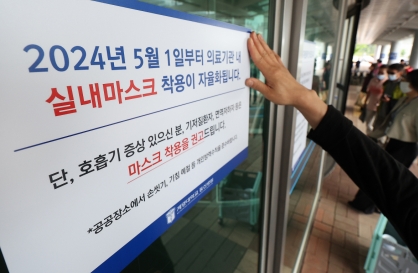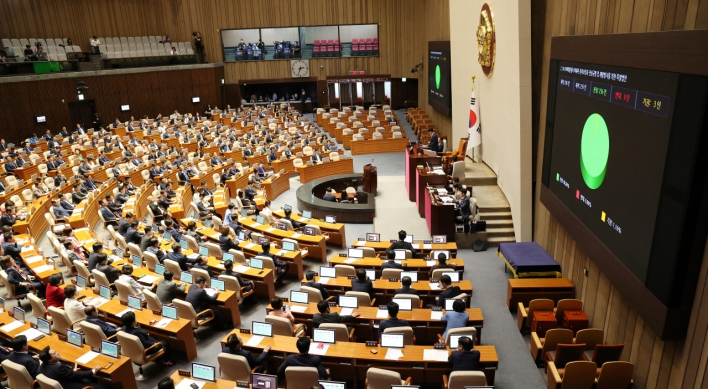Sluggish demand at home and abroad, slowing money flow add to deflation fears amid euro crisis
Korea is facing rising deflationary concerns, experts said, as worsening external economic conditions weigh on the export-dependent economy and the property market slump draws out.
Deflation, a decrease in the general price level of goods and services, is caused by many factors including a deflationary gap, in which total spending in an economy is insufficient to buy all the output that can be produced with full employment.
The Bank of Korea cut the benchmark interest rate last week, ending a 13-month freeze, citing a minus GDP gap, or a deflationary gap. If the GDP gap, or the actual economic output minus potential output, yields a negative number, it is called a deflationary or recessionary gap.
Weakening demand leads to waning investment, fewer jobs and reduced household incomes, causing further decline in consumption. The cycle repeats itself, stalling both growth and prices.
Deflation, which comes with falling asset value, is especially feared in Korea as the country’s household debts have snowballed to nearly 1,000 trillion won, most of which was borrowed using real estate as collateral.
Huh Jin-wook, an economist at Samsung Securities, said the Korean economy would slow down significantly unless the government takes adequate fiscal policy measures.
“The situation in Korea is more worrisome than in the U.S. and China as domestic investment and consumption are falling at sharper rates,” Huh said.
“Korea has relatively more elbowroom for monetary and fiscal policies. The BOK cut the key interest rate last week, and we believe a revised supplementary budget is also necessary, but the government hasn’t moved in that direction yet.”
Huh warned that without strong fiscal policy measures, the Korean economy won’t be able to withstand the impact of the global slowdown in exports.
He forecast negative growth in Europe in the second quarter, low U.S. growth this year of around 2 percent and Chinese growth of not lower than 7 percent.
“Korea won’t show negative annual growth, but if the annual growth dwindles to a little over 2 percent, it would feel like an economic recession,” Huh said.
“Quarterly growth could turn minus year-on-year due to sluggish demand, which would raise deflationary pressure.”
The central bank lowered Korea’s economic growth outlook to 3 percent last week from its earlier projection of 3.5 percent.
The BOK also said that the country’s consumer price inflation will mark 2.7 percent this year, down 0.5 percentage point from its earlier forecast, after June’s consumer price inflation fell to 2.2 percent.
Byun Yang-gyu, macroeconomist at the Korea Economic Research Institute, said there is a fair chance of deflation as asset values will continue to drop due to weakening demand.
“After the collapse of Lehman Brothers, many countries injected a great amount of money into the markets through quantitative easing, and most of the money flowed into East Asia which showed relatively better economic conditions, thus pushing up prices,” he said.
“But with economic conditions turning bad across the globe this year, people are not willing to spend or invest even if they have the money.”
Korea’s money circulation is slowing, adding to fears of deflation.
The country’s money multiplier, the core indicator used to assess circulation levels, in May tumbled to its lowest since 2000.
New facility investments by listed companies in the first half of this year plummeted 70.5 percent from a year ago on growing economic uncertainties at home and abroad.
Household consumption is also declining. Sales for large discount chains and department stores in June fell 7.4 percent and 1.2 percent, respectively, on-year.
U.S. Federal Reserve chairman Ben Bernanke said on Tuesday that there is a possibility of deflation in the U.S.
“I think inflation risk is relatively low now. Not everyone agrees with that, but my personal opinion is that that risk is reasonably low right now,” Bernanke said during a Senate banking committee hearing.
“There is a modest risk ― not a large risk but a modest risk ― of going in the other direction, which is towards the deflationary side.”
By Kim So-hyun (sophie@heraldcorp.com)
Korea is facing rising deflationary concerns, experts said, as worsening external economic conditions weigh on the export-dependent economy and the property market slump draws out.
Deflation, a decrease in the general price level of goods and services, is caused by many factors including a deflationary gap, in which total spending in an economy is insufficient to buy all the output that can be produced with full employment.
The Bank of Korea cut the benchmark interest rate last week, ending a 13-month freeze, citing a minus GDP gap, or a deflationary gap. If the GDP gap, or the actual economic output minus potential output, yields a negative number, it is called a deflationary or recessionary gap.
Weakening demand leads to waning investment, fewer jobs and reduced household incomes, causing further decline in consumption. The cycle repeats itself, stalling both growth and prices.
Deflation, which comes with falling asset value, is especially feared in Korea as the country’s household debts have snowballed to nearly 1,000 trillion won, most of which was borrowed using real estate as collateral.
Huh Jin-wook, an economist at Samsung Securities, said the Korean economy would slow down significantly unless the government takes adequate fiscal policy measures.
“The situation in Korea is more worrisome than in the U.S. and China as domestic investment and consumption are falling at sharper rates,” Huh said.
“Korea has relatively more elbowroom for monetary and fiscal policies. The BOK cut the key interest rate last week, and we believe a revised supplementary budget is also necessary, but the government hasn’t moved in that direction yet.”
Huh warned that without strong fiscal policy measures, the Korean economy won’t be able to withstand the impact of the global slowdown in exports.
He forecast negative growth in Europe in the second quarter, low U.S. growth this year of around 2 percent and Chinese growth of not lower than 7 percent.
“Korea won’t show negative annual growth, but if the annual growth dwindles to a little over 2 percent, it would feel like an economic recession,” Huh said.
“Quarterly growth could turn minus year-on-year due to sluggish demand, which would raise deflationary pressure.”
The central bank lowered Korea’s economic growth outlook to 3 percent last week from its earlier projection of 3.5 percent.
The BOK also said that the country’s consumer price inflation will mark 2.7 percent this year, down 0.5 percentage point from its earlier forecast, after June’s consumer price inflation fell to 2.2 percent.
Byun Yang-gyu, macroeconomist at the Korea Economic Research Institute, said there is a fair chance of deflation as asset values will continue to drop due to weakening demand.
“After the collapse of Lehman Brothers, many countries injected a great amount of money into the markets through quantitative easing, and most of the money flowed into East Asia which showed relatively better economic conditions, thus pushing up prices,” he said.
“But with economic conditions turning bad across the globe this year, people are not willing to spend or invest even if they have the money.”
Korea’s money circulation is slowing, adding to fears of deflation.
The country’s money multiplier, the core indicator used to assess circulation levels, in May tumbled to its lowest since 2000.
New facility investments by listed companies in the first half of this year plummeted 70.5 percent from a year ago on growing economic uncertainties at home and abroad.
Household consumption is also declining. Sales for large discount chains and department stores in June fell 7.4 percent and 1.2 percent, respectively, on-year.
U.S. Federal Reserve chairman Ben Bernanke said on Tuesday that there is a possibility of deflation in the U.S.
“I think inflation risk is relatively low now. Not everyone agrees with that, but my personal opinion is that that risk is reasonably low right now,” Bernanke said during a Senate banking committee hearing.
“There is a modest risk ― not a large risk but a modest risk ― of going in the other direction, which is towards the deflationary side.”
By Kim So-hyun (sophie@heraldcorp.com)
-
Articles by Korea Herald




![[Music in drama] Rekindle a love that slipped through your fingers](http://res.heraldm.com/phpwas/restmb_idxmake.php?idx=644&simg=/content/image/2024/05/01/20240501050484_0.jpg&u=20240501151646)

![[New faces of Assembly] Architect behind ‘audacious initiative’ believes in denuclearized North Korea](http://res.heraldm.com/phpwas/restmb_idxmake.php?idx=644&simg=/content/image/2024/05/01/20240501050627_0.jpg&u=20240502093000)


![[KH Explains] Will alternative trading platform shake up Korean stock market?](http://res.heraldm.com/phpwas/restmb_idxmake.php?idx=644&simg=/content/image/2024/05/01/20240501050557_0.jpg&u=20240501161906)









